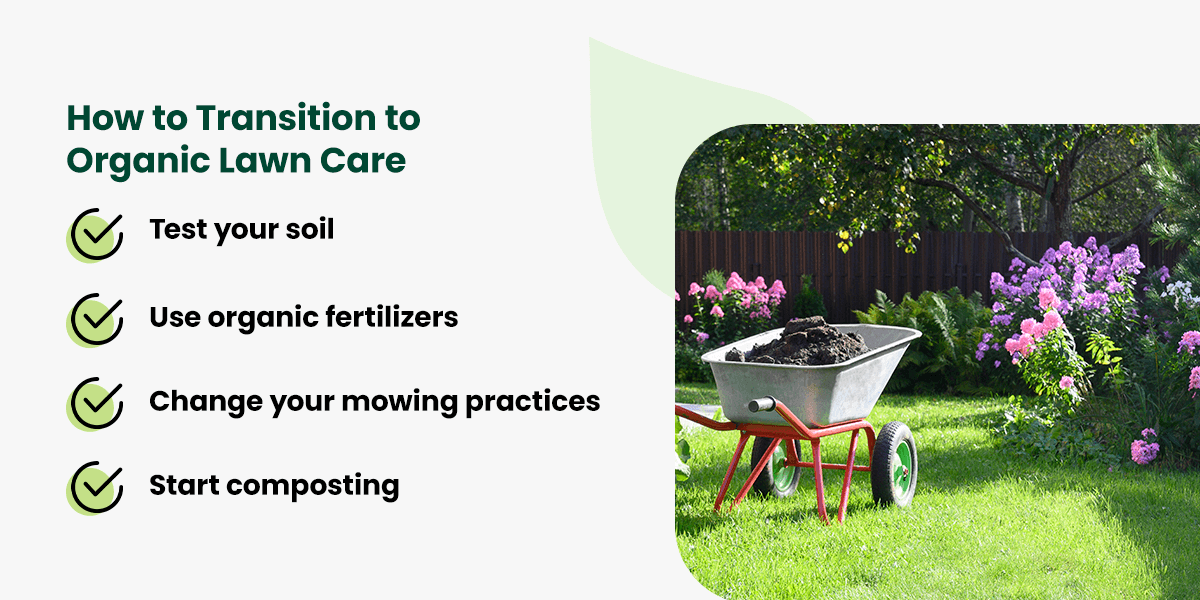Are you thinking about switching to organic lawn care? This guide will help you make the transition smoothly. Organic lawn care is better for the environment and your family’s health. Let’s get started!
Why Choose Organic Lawn Care?
Organic lawn care uses natural products. These products do not harm the environment. They also make your lawn healthier. Here are some benefits of organic lawn care:
- Improves soil health
- Reduces chemical runoff
- Safe for kids and pets
- Supports biodiversity
Steps to Transition from Synthetic to Organic Lawn Care
1. Test Your Soil
The first step is to test your soil. Soil tests help you understand what your lawn needs. You can buy a soil test kit from a garden center. Follow the instructions to collect a soil sample. Send the sample to a lab for analysis. The results will tell you the pH level and nutrient content of your soil.
2. Stop Using Synthetic Chemicals
Stop using synthetic fertilizers, herbicides, and pesticides. These chemicals can harm beneficial insects and soil life. Replace them with organic alternatives. Organic products are made from natural materials. They work with the ecosystem, not against it.
3. Improve Soil Health
Healthy soil is the foundation of a beautiful lawn. Add organic matter to improve soil health. Compost, manure, and leaf mulch are great options. Spread a thin layer over your lawn and water it in. This helps feed the soil and the grass.
4. Choose The Right Grass
Some grass types are better suited for organic lawns. Choose grass that is native to your area. Native grasses are more resistant to pests and diseases. They also require less water and fertilizer.
5. Mow Properly
Mowing is important for lawn health. Set your mower blades higher. Longer grass shades the soil and reduces water loss. It also helps prevent weeds. Mow regularly but do not cut more than one-third of the grass height at once.
6. Water Wisely
Water your lawn deeply and infrequently. This encourages deep root growth. Water early in the morning to reduce evaporation. Avoid watering at night to prevent fungal diseases.
7. Use Natural Fertilizers
Organic fertilizers provide nutrients slowly. This helps the grass grow steadily. Some good options include compost, bone meal, and fish emulsion. Apply fertilizers according to the package instructions. Do not over-fertilize as it can harm the lawn.
8. Control Weeds Naturally
Weeds compete with grass for nutrients and water. Use natural methods to control weeds. Hand-pull weeds regularly. Mulch can also help prevent weeds. Apply a layer of organic mulch around trees and flower beds.
9. Manage Pests Organically
Pests can damage your lawn. Use organic methods to manage pests. Beneficial insects like ladybugs and nematodes can control harmful pests. You can also use natural pesticides like neem oil and insecticidal soap.
Common Challenges and Solutions
Transitioning to organic lawn care can have challenges. Here are some common issues and solutions:
| Challenge | Solution |
|---|---|
| Weed Infestation | Hand-pull weeds and use mulch to prevent them. |
| Pest Problems | Introduce beneficial insects and use natural pesticides. |
| Poor Soil Health | Add organic matter like compost and manure. |
| Slow Grass Growth | Use organic fertilizers and water deeply. |

Credit: www.organiclawns.net
Maintaining Your Organic Lawn
Maintaining an organic lawn requires regular care. Here are some tips to keep your lawn healthy:
- Water deeply and infrequently
- Mow regularly but keep the grass longer
- Apply organic fertilizers as needed
- Hand-pull weeds and use mulch
- Monitor for pests and use organic controls

Credit: www.amazon.com
Frequently Asked Questions
What Is Organic Lawn Care?
Organic lawn care uses natural methods and products to maintain a healthy lawn without synthetic chemicals.
Why Switch To Organic Lawn Care?
Organic lawn care is safer for children, pets, and the environment, and it promotes healthier soil and plants.
How Do I Start Organic Lawn Care?
Begin by stopping synthetic treatments. Test soil, add compost, and use organic fertilizers and pest control.
How Long Does The Transition Take?
The transition can take one to two years, depending on soil health and previous synthetic chemical use.
Conclusion
Transitioning from synthetic to organic lawn care is a great choice. It benefits the environment and your family’s health. Follow these steps to make the transition smooth. Test your soil, stop using synthetic chemicals, and improve soil health. Choose the right grass, mow properly, and water wisely. Use natural fertilizers, control weeds, and manage pests organically. With regular care, your organic lawn will thrive.
Ready to make the switch? Start your journey to a healthier, greener lawn today!
